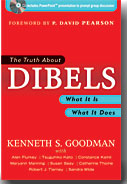
What It Is - What It Does
By Kenneth S. Goodman. Copyright 2006.
Foreword by P. David Pearson
To order, click on the publishers website: Heinemann
DIBELS is the worst thing to happen to the teaching of reading since the development of flash cards.—P. David PearsonDynamic Indicators of Basic Early Literacy Skills (DIBELS) is wildly popular up and down the local and state education hierarchies. It’s easy, quick, and an approved Reading First assessment tool. So what’s not to like? EVERYTHING.
In The Truth About DIBELS you’ll find out why teachers, administrators, and reading researchers nationwide are emphatically resisting the insidious influence of DIBELS. Well-known education writers—including P. David Pearson, Robert Tierney, Sandra Wilde, and Maryann Manning—tell you how DIBELS hurts students and teachers and why impairs learning and teaching. They present chapters that:
- dispel the science and methodology that "support" DIBELS
- critique the validity of the information that DIBELS spits out
- demonstrate how DIBELS warps instructional planning to fit its limited measurements—and to fit the political ends of its creators and supporters
- expose the fiction behind its supposedly miraculous success rates
If DIBELS is creeping into your classroom, school, district, or state—or if it’s already taken over—read The Truth About DIBELS. Then use its accompanying CD, loaded with a complete anti-DIBELS PowerPoint presentation, to show colleagues, policy makers, or parents that when it comes to reading assessment, DIBELS just doesn’t work.
coming soon)
Edited by Ken Goodman. Copyright 2006.
To order, click on the publishers website: Vermont Society for the Study of Education, Inc.
The book's main contributor and editor is the nationally and internationally renowned reading authority Ken Goodman, Professor Emeritus from the Department of Language, Reading and Culture at the University of Arizona. Goodman is past president of the International Reading Association and the National Conference on Language and Literacy. Expertly evoking the DIBELS landscape, Goodman sees it as "a set of silly tests" that "misrepresent pupils" and "demean teachers." However, his ultimate depiction of DIBELS is as the "pedagogy of the absurd."
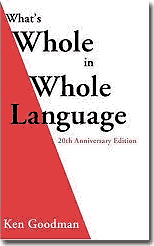
20th Anniversary Edition
By Ken Goodman. Copyright 1986, 2005.
To order, click on the publishers website: RDR Books
With more than 250,000 copies in
print around the world, What's Whole in Whole Language is now back
in print in this updated 20th anniversary edition, which includes a new
afterword by the author.
This book contributed to a grassroots movement that has united students,
parents, and teachers. Whole language is now a vital part of the
curriculum in schools spread across the Americas, Asia, Australia, Europe,
and Africa.
The success of whole language has made author Ken Goodman a sought-after
speaker at educational conferences around the world. "Everything I
know," he says, "I've learned from kids."
The books major purpose is to describe the essence of the whole language
movement - its basis, its features, and its future. More specifically it
will:
- describe what we know about language and language development;
- present a whole language perspective on literacy development, both reading and writing;
- provide criteria that parents and teachers can use in helping children to develop literacy;
- mention examples of whole language programs that are already at work; and
- suggest directions for building whole language programs and transforming existing programs into whole language programs.
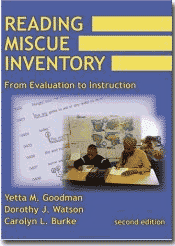
From Evaluation to Instruction
By Yetta M. Goodman, Dorothy J. Watson, and Carolyn L. Burke
Second Edition, Copyright 2005.
To order, click on the publishers website: Richard C. Owen Publishers, Inc.
What Professional Educators Say about Reading Miscue Inventory ...
At a time when teachers and
schools are being called upon to document the progress their students are
making in reading and math, I can't think of a better book to put in the
hands of classroom teachers. I use the Reading Miscue Inventory routinely
at the middle school level, particularly when developing plans to support
readers who seam to be struggling. Even when I am not completing a formal
miscue analysis, I listen to readers for the information the RMI has
helped me to value.
Kathryn Mitchell Pierce, Ph.D.
Middle School Literacy Teacher, Clayton, Missouri
Editor of Adventuring with Books, 12th Edition
This authentic assessment
provides substantive data on how readers engage with the reading process
to make meaning; it also illuminates the disconnects in that process when
reading is challenging. unlike most reading assessments that only provide
a label or a "level," the Reading
Miscue Inventory provides teachers with the insights to know how to
help readers better succeed.
Wendy C. Kasten, Ph.D.
Professor of Curriculum and Instruction-Literacy, Kent State University
Coauthor of Living Literature: Using Children's Literature to Support
Reading and Language Arts
In this era of high stakes
testing and commercial classroom reading tests, the Reading
Miscue Inventory restores professionalism to teacher assessment and
hope for our nation's readers. This new edition succeeds in making our
most powerful tool for revealing readers' strengths and needs even more
accessible than ever, with clear directions for implementation,
interpretation, and instructional applications. These literacy luminaries
are once again lighting our way!
Bess Altwerger, Ed.D.
Professor of Elementary Education, Towson University
Author and Editor of Reading for
Profit: How the Bottom Line Leaves Kids Behind
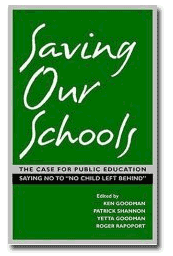
The Case for Public Education
Saying No To "No Child Left Behind"
Edited by Ken Goodman, Yetta Goodman, Patrick Shannon, and Roger Rapoport. Copyright 2004.
To order, click on the publishers website: RDR Books
A stealth campaign to privatize
American education, George Bush's "No Child Left Behind" (NCLB)
threatens to close more than 6,000 public schools, pushing dedicated
teachers and disadvantaged children out of our neighborhood schools.
In Saving Our Schools, leading educators and researchers show how
NCLB shifts control of every aspect of American public education to a
faceless Washington bureaucracy while marginalizing successful methods,
materials, teacher education, staff development programs, and curriculum.
Saving Our Schools investigates the devastating results of forcing
financially strapped schools to squander meager resources on high stakes
standardized tests. It reveals how the government blacklists successful
professors, institutions, methods, and materials that deviate from the
NCLB party line. It exposes George Bush's top education advisors who call
National Education Association members "terrorists" and would
like to "blow up" teachers' colleges.
A citizens' call to unite in defense of public education, Saving Our
Schools urges every American parent and teacher to take action now -
before time runs out.
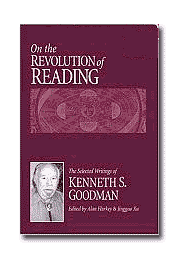
The Selected Writings of Kenneth S. Goodman
Edited by Alan D. Flurkey & Jingguo Xu. Copyright 2003.
To order, click on the publishers website: Heinemann
Like all visionaries, Ken Goodman has had ideas that are truly different, wholly new, and completely unforeseen. And like the work of any "heretic," his model of the reading process has met with its share of controversy. In 1967, he spawned a revolution with his article "Reading: A Psycholinguistic Guessing Game." Disputing the view of reading as sequential word recognition, Goodman argued for the understanding of reading as a process of constructing meaning, of making sense of print. Since then, he has continued to publish extensively on the reading process, sharing his insights with teachers who could apply them to their classroom practices. Now, for the first time, the best of Goodman's provocative writings are available in one convenient volume.
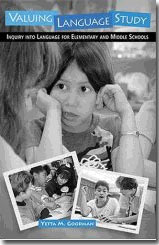
Inquiry Into Language for Elementary and Middle Schools
By Yetta M. Goodman. Copyright 2003.
To order, click on the publishers website: National Council of Teachers of English
Everyday in so many ways,
children are surrounded by language: from the language of home and family,
to the never-ending bombardment of environmental print, to the clash
between school admonitions to use "standard" English and their
peer groups' specialized and invented speech. Why not assume, then, that
students love to think and talk about language as much as teachers do? And
they do, asserts language development researcher and teacher educator
Yetta M. Goodman, if given opportunities to explore language issues and
questions that arise naturally.
Valuing Language Study offers teachers a rich language studies
curriculum they can adapt to the needs of their elementary and middle
school students, providing opportunities to talk, write, read, and think
about language in ways that increase their self- confidence in their
ability to use language flexibly and appropriately. In such a curriculum,
teachers can share with students their love of and curiosity about
language: Why do children and adolescents constantly invent new language?
How do people use language to control others? Why is there such emphasis
in the schools on speaking and writing one "correct" language
form?
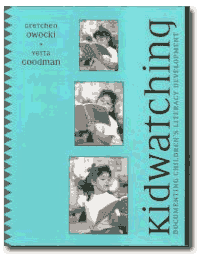
Documenting Children's Literacy Development
By Yetta Goodman and Gretchen Owocki.
Copyright 2002.
To order, click on the publishers website: Heinemann
This smart, practical guidebook
shows preschool, kindergarten and primary teachers how to refine their
literacy evaluation practices through careful kidwatching. By observing
and recording children's literacy development, teachers also develop new
understandings of the ways children think and learn.
In each chapter, the authors provide: a clear description of how
kidwatching enhances teaching and learning, specific guidelines and
suggestions for kidwatching, practical tools and resources to be used in
documentation and analysis, and empowerment for children-a chance to
evaluate and revalue themselves by partnering with teachers to document
and reflect on their knowledge.
Kidwatching provides a framework for engaging in systematic, yet very
personalized, data collection in all areas of literacy. high-quality
kidwatching gives teachers the information they need to teach effectively
and to share detailed, factual information with families and
administrators. Kidwatching can also be used to strengthen school reform
and to develop a common set of principles and practices that are in tune
with local needs and interests. Learn to watch kids and see how effective
you can be on these fronts.